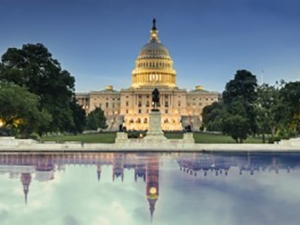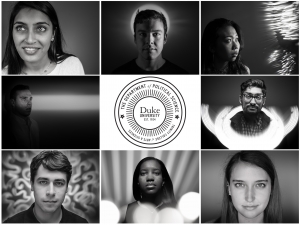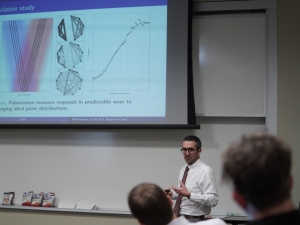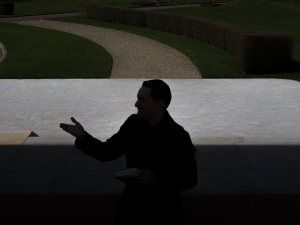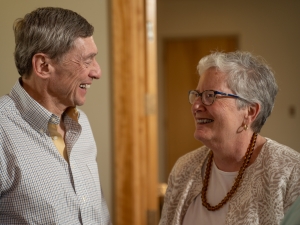The exploration the public lives of the “first ladies” of America’s Christian evangelical megachurches and an intimate portrait of the joys and hardships of rural life in Appalachia are among the new noteworthy books by Duke authors this fall. Many of the books, including new editions of previous titles, can be found on the "Duke Authors" display shelves near the circulation desk in Perkins Library. Some are available as e-books for quick download. Most can also be purchased through the Gothic Bookshop. [Duke Today will… read more about Fall Books: Clean Hands, Aging Brains, Evangelical Women and Other Great Reads »
President Trump’s decision to pull U.S. troops out of northern Syria without the traditional consultation of military and other leaders means he “alone bears the political price for any adverse developments,” says a Duke political scientist. That scenario already appears likely. Turkey’s military began bombing the area as its troops crossed into Syria Wednesday in an operation already planned but not carried out until the U.S. troop withdrawal. Turkey’s stated goal was to root out Syrian Kurdish fighters, an American ally… read more about Feaver: Why Undermining the Kurds Could Hurt U.S. Relations With Allies »
Political Science Professor Michael Munger discusses the California bill that distinguishes between contractors and employees. Read his full article on The Hill. read more about Michael Munger: Distinguishing contractors from employees »
The political headlines coming out of the United Kingdom this past week were shocking: A rebellion of Conservative Party members in Parliament threw the party into a civil war and put Prime Minister Boris Johnson’s plans on Brexit into doubt. However, perhaps, the biggest surprise might be this: Why hasn’t the same thing happened in the United States? Both Johnson and U.S. President Donald Trump are political disrupters, proudly willing to ignore traditional political norms and practices. For Trump, that disruption has… read more about Why have Conservatives in Britain rebelled, but Republicans in Congress have not? »
Political Science Professor Eddy Malesky and a lecturer from the Australian National University surveyed people in Vietnam to see if those in developing countries prioritize the economy or the environment. Listen to the results during their podcast on Rocking Our Priors. read more about "Fish or Steel?": Dr Quynh Nguyen & Professor Eddy Malesky »
Over spring break 2019, the Duke Program in American Grand Strategy hosted its annual international staff ride. Led by Professor Peter Feaver, 40 Duke students, faculty, alumni and guests traveled throughout Gibraltar and Morocco tracing the steps of Operation Torch, part of the US North Africa Campaign during World War II. The AGS Staff Ride to Morocco was the highlight of the semester for me and for many of the students who took part. Our team came from a wide range… read more about Student Stories: touring Morocco and learning lessons from war »
Over the past 50 years, John Aldrich and David Rohde have shared many academic milestones. They met as graduate students at the University of Rochester. Both launched their teaching careers at Michigan State University. And they both ended up as political science professors at Duke. On Friday, they will share the American Political Science Association’s Barbara Sinclair Legacy Award. The award – named after a former colleague who also earned a Ph.D. at Rochester -- recognizes “the work of a scholar or set of scholars who… read more about 50 years of friendship and scholarship: Aldrich and Rohde receive career Legacy Award »
Over the past 50 years, John Aldrich and David Rohde have shared many academic milestones. They met as graduate students at the University of Rochester. Both launched their teaching careers at Michigan State University. And they both ended up as political science professors at Duke. On Friday, they will share the American Political Science Association’s Barbara Sinclair Legacy Award. The award – named after a former colleague who also earned a Ph.D. at Rochester -- recognizes “the work of a scholar or set of scholars… read more about Aldrich and Rohde: 50 Years of Shared Milestones »
The Duke Political Oracles is a series of undergraduate portraits of political science majors in their junior and senior year. Following oracle metaphors from classical antiquity, this portrait series dramatizes what clairvoyance may have looked like. Student participants complimented these portraits with quotes about their research interests, written in a style meant to dramatize the scale of their concern, and the breadth of their interests. Our legal system assumes… read more about Duke Political Oracles - A portrait series highlighting undergraduate vision »
Duke hosted a small conference with student presenters and faculty discussants from Duke, Rochester, and Emory. This is an opportunity for students to polish work before larger conference presentations and publication submission. Thursday, June 13 Jason Todd (Duke), "Differences of Opinion: Measuring Polarization at the U.S. Supreme Court via Bipartite Networks of Opinion Coalitions" Discussant: Mary Kroeger Travis Curtice (Emory), "Police and Co-ethnic Bias in Autocracies: Evidence from… read more about The 2019 Duke-Emory-Rochester Grad Student Conference »
Sometimes I think Duke should have come with a warning label: WARNING: YOU ARE ENTERING A MAGICAL PLACE! Here, beneath the spires of West Campus, on a still night, when the fog rolls in, it’s not difficult to imagine elves or fairies winking at you from shadowy archways. On such nights, you can almost make out the distant gallop of centaurs in the Duke Forest or the soft hiss of a friendly basilisk in the tunnels under East Campus. Duke is a magical place. And if you widen your imagination, you might see that the deeper… read more about Warning: You are Entering a Magical Place - Matthew King's Senior Class Day Speech »
After 32 years as a Professor of Political Science and Senior Fellow at the Kenan Institute, Professor Ruth Grant is stepping down and into retirement. Since its creation 23 years ago, Ruth has been a staunch advocate at the Institute inspiring faculty, staff and students alike. Her intellect, programmatic savvy and generosity were critical to the success of the Ethics & Society Certificate Program, the Staff Ethics Book Clubs, The Cover Ups working group and faculty projects on both goodness and evil. Last Tuesday was… read more about Ruth Grant retires after a career at Duke Political Science & Kenan »
A developing strand of sociological research studies the relationships between occupations and political outlooks and preferences, following groundbreaking work by Herbert Kitschelt and Philippe Rehm using the European Social Survey. Although sophisticated sociological modeling is required to demonstrate the relationships between occupations and political preferences, there is a basic underlying sense that what a person spends most of their time on conditions their political outlooks. This is too obvious to be ignored… read more about "Groundbreaking" - a review of Herbert Kitschelt's research on political preference formation »
Kyle Beardsley, Associate Professor of Political Science recently coauthored "Mediation, Peacekeeping, and the Severity of Civil War" with David Cunningham and Peter White. While all civil wars involve the loss of life, there is very large variation between and within conflicts in how many people are killed. The Syrian civil war, which began in 2011, has resulted in hundreds of thousands of deaths. Civil wars in Ethiopia in the 1980s and early 1990s, Afghanistan, and Sri Lanka have also generated large numbers… read more about "Mediation, Peacekeeping, and the Severity of Civil War" - Kyle Beardsley coauthors »
From the New Books Network: One of the themes of the era of Donald Trump is whiteness and white identity. From his first steps into the public eye, Trump used race to frame his positions and relevance. His presidency has been no different. White identity, though, has remained a confusing topic to understand and precisely measure. What does it mean to hold the identity of the dominant racial group? Does white identity even exist? And if it does, what does it mean? Ashley Jardina answers dozens of questions like… read more about Ashley Jardina podcasts on The New Books Network »
On Nov. 10, 2016, Pat Shanahan, chair of the University of Washington’s board of regents, delivered a message to students and faculty shaken by the election of President Donald Trump two days before: All is not lost. “The UW knows what it is and all is not lost,” Shanahan said, according to meeting minutes. He urged the university community to come together and “stay focused on what’s important knowing there will be a lot of change.” Two years on, Shanahan is poised to helm a very different institution: the most… read more about The Seattle Times interviews Peter Feaver about Pat Shanahan's qualifications »
Thomas Edsall, New York Times opinion author, received advanced copy of Ashley Jardina's new book, White Identity Politics. His recent article, "White Identity Politics Aren't Going Anywhere," centers around the findings of Jardina's research. Edsall wonders what constitutes American white identity and racial resentment in a shifting demographic landscape. To explore some of the findings of Jardina's research before her book's release, follow this link.… read more about New York Times Op-Ed analysis of Ashley Jardina's new research »
Those empty Sears, Penny’s, and other large retailer stores at your local mall may soon be repurposed as flexible retail platforms where online sellers can let people interact with their products at very low cost. Firms may become dramatically smaller, as other systems for controlling transaction costs replace them. Stores will act like miniature malls, renting space, not selling products. Richard Sears was originally a railroad man; he vertically integrated into retail through his famous Sears Catalogue as a way to ensure… read more about Will Reducing Transaction Costs Be the End of Retail? - Michael Munger writes for AIER »
One of the proposed benefits of third-party involvement that has been offered to justify its use is that it helps reduce the severity of conflict. Existing work finding that peacekeeping operations reduce battle-related fatalities considers peacekeeping in isolation from other forms of third-party diplomatic involvement, such as mediation. We argue that mediation has its own effect on patterns of violence. Moreover, we argue that peacekeeping and mediation can have an interactive effect, in which each enhance the violence-… read more about Mediation, Peacekeeping, and the Severity of Civil War - Kyle Beardsley coauthors »
Sponsored by the Department of Political Science and the Asian Pacific Studies Institute The third iteration of the NEW FACES IN CHINA STUDIES CONFERENCE at Duke University welcomes 10 advanced graduate students, selected from a competitive pool of applicants from universities across the United States and in Canada, to join graduate students and faculty members in political science at Duke University in presenting and discussing original, rigorous research that advances our knowledge about… read more about New Faces in China Studies Conference »
Justin Sherman, political science undergraduate student and fellow in New America's Cybersecurity Initiative recently coauthored with Deb Crawford for War on the Rocks arguing that, "adapting risk-based cybersecurity frameworks is crucial for addressing threats to infrastructure systems that are vulnerable to hacking." Electrical grid blackouts, traffic light malfunctions, air traffic control failures, production plants gone haywire — for a while, such events were merely the stuff of Hollywood… read more about Securing America's Connected Infrastructure Can't Wait - Justin Sherman coauthors »
A group of Foreign Policy's most seasoned authored gathered to remember the life and times of George H. W. Bush. Peter Feaver, who is a longstanding contributing author, offered his reflection, having worked closely in two other Presidents' cabinets. I did not work in the George H.W. Bush administration, but when I reflect on his life of service, three remembrances loom large. First, he was mocked and vilified by partisan elites all out of proportion to any real defects—and he bore it with greater grace… read more about Peter Feaver remembers Georg H W Bush »
On Sunday November 11, 2018 the world paused to reflect on the centenary armistice of WWI. The memory of war weighs heavy on the next generation of leaders and many Duke students are interested in learning from the how to avoid war and how to conduct it, when necessary. This year, the Duke University Program in American Grand Strategy held their ambitious 'Staff Ride' in Europe, traversing WWI battlefields and memorials. Staff rides are opportunities for students to role play military and war-period… read more about Students participate in flagship university trip - studying WWI »
From Duke Today: If Taylor Swift’s admonition to vote doesn’t move the needle among young Americans this year, researchers at Duke can help explain why. Students in a Bass Connections project are researching why so many young voters, even those who say they’re politically motivated, often fail to turn out at the polls. “It’s always been pathetic,” says Sunshine Hillygus, a political scientist at Duke who studies voter behavior and co-leads the Bass Connections project. In 1972, the… read more about Why So Many Young People Don't Vote - Bass Connections team profile »
Justin Sherman, a junior at Duke double majoring in political science and computer science, was just named a Cybersecurity Policy Fellow at New America, a nonpartisan think tank headquartered in Washington, D.C. At Duke, he is the Co-Founder and President of Duke’s Cyber Club and Cyber Team and is co-teaching Duke’s “Cyber and Global Security” seminar. The fellowship is a one-year, non-resident program hosted jointly by the Open Technology Institute and the Cybersecurity Initiative at New America, an… read more about Justin Sherman named Cybersecurity Policy Fellow at New America »
At 2:18 p.m. Eastern time on Oct. 3, nearly all mobile phones in the United States simultaneously received an alert with the message: “Presidential Alert: THIS IS A TEST of the National Wireless Emergency Alert System. No action is needed.” In a less polarized environment, this test might have been viewed as routine. After all, the presidential alert system is the product of a bipartisan effort to improve emergency communications after Hurricane Katrina, established with an executive order by President George W. Bush in… read more about The perception of the nationwide alert - Brian Guay and Jesse Lopez write for Monkey Cage »
Another receptive audience for Trump’s disinformation campaigns is made up of foreign despots, such as Gulf monarchs, who face fewer constraints on their actions than he does. On Saturday, the Saudi regime warned its citizens that “sharing or spreading rumors or fake news that might affect public order and security is considered cybercrime punishable by 5-year imprisonment,” the Saudi Gazette reported. On Sunday night, Timur Kuran, a Middle East specialist at Duke University, noted, on Twitter, “The ‘fake news’ narrative is… read more about The fake news narrative - Timur Kuran cited in The New Yorker »
On 31 September 2018, 2nd year Political Science PhD student Joe Brown promoted to the rank of Lieutenant Colonel in the US Air Force. The promotion ceremony was a tri-service affair as the presiding officer was LCDR Dan Struble, US Naval Reserve (Retired) and Associate Dean of the Duke Divinity School and the narrator was 1LT David Holmes, US Army National Guard, and 2nd year dual Master’s Student in Political Science and Theology. Joe is studying Security, Peace, and Conflict in the department as part of the USAF School… read more about Joseph Brown promoted to Lieutenant Colonel »
Nikki Haley—the U.S. ambassador to the United Nations, who on Tuesday announced her intention to resign at the end of the year—has a rare quality among Trump administration cabinet officials: She is set to end her time in office with her reputation enhanced, not diminished. Likewise, she has had to serve as the public face for unpopular U.S. policies and thus deal with admonishments by foreign diplomats angered by them. But that, too, is a role that her predecessors played. She has not come to be perceived as the primary… read more about Nikki Haley will be back - Peter Feaver writes for Foreign Policy »
In a recent debate about the Bribery Act of 2010, the UK House of Lords solicited expert analysis from Edmund Malesky and Nathan Jensen. Their statement was entered in as written evidence: "We find that this convention, and more importantly the underlying domestic laws such as the 2010 United Kingdom Bribery Act, are very effective in reducing bribery behavior relative to countries that haven’t enacted bribery laws. In short, strong domestic laws that criminalize bribery and enforce these laws, reduce… read more about UK House of Lords requests Edmund Malesky's research on corruption »



